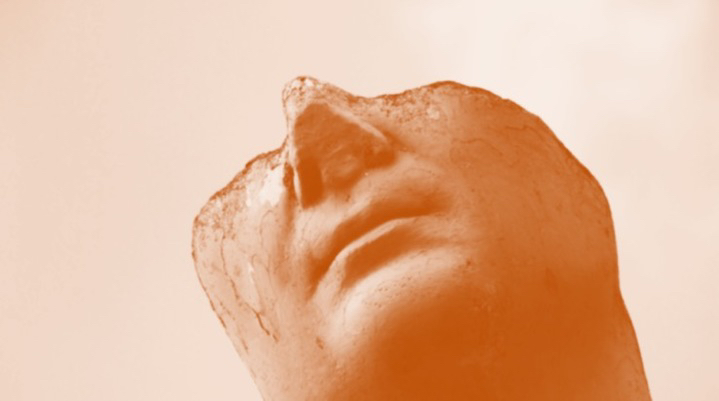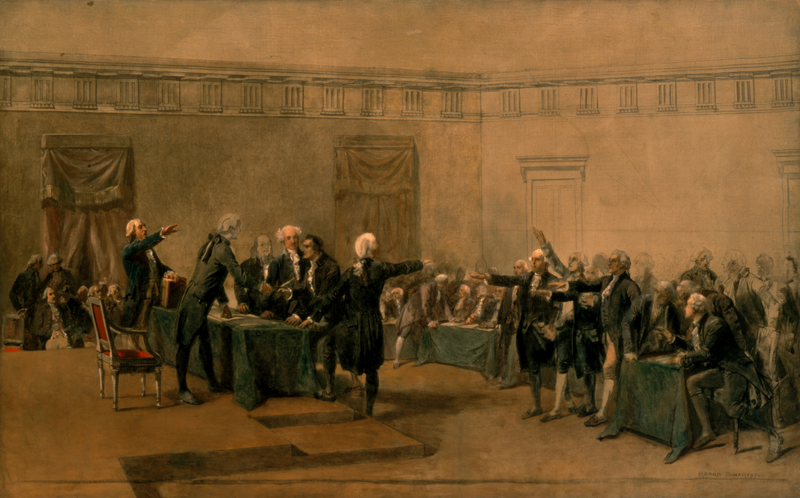Democracy and despotism in a digital age.
Sacred Cows

What I saw at the American Academy of Religion.
Finding the right metaphor is difficult. The leadership of AAR/SBL is fiddling? Naked? On a deck chair sinking into the cold North Sea? And the fiddle is on fire…
Let me explain. The AAR/SBL is the annual joint conference of the American Academy of Religion and the Society of Biblical Literature. Just about everyone who has gotten a PhD in Theology, Religious Studies, or Biblical Literature or History has made the pilgrimage to this conference. And for those precious few who have gone on to be hired into the guild of university professors it is something they enjoy—or endure—annually.
It might sound nice and prestigious, but the system is broken and no one is interested in fixing it. In fact, anyone seen trying to fix it is likely to be blacklisted. But they won’t use the term “blacklisted”—that’s racist.
Why should you care? Because the people at AAR/SBL have one task, professionally, and that task is to teach first principles to American college students. Yet these same academics are among the most dysfunctional and self-destructive people in the country.
PhDs Without Borders
Walking into the conference there are two categories of people. There are the young who have given a short lifetime to this and there are the old who take for granted that ze trains vill keep running on time. It is perhaps the only place on earth you can get stuck behind a woman on an elevator and overhear the casual phrase “I did a womanist reading of the Gospel,” to which her friend responds, “I really feel that, it moved me.”
Everyone here knows what “womanist” means; that’s how out of touch they are. At the top of the elevator I see a familiar face in a small group and I wander over. We talk for a while but he backs away nervously when I explain the ways yoga may be a beachhead for a Hindu takeover of American religious life. This is too much for my friend. Any attempt to teach something like a perspective that is pro-Christian (to say nothing of pro-America) is totally unwelcome here. He comes up with an excuse to leave the group and shakes my hand, establishing a formal distance from me (“social distance” did not yet exist). His palm is sweaty. The economics of yoga are clear. The economics for religious study, less so.
I’ve never seen a better argument for a border wall than this conference. Which is not to say it was particularly diverse. My woke friends are right: There are a lot of khaki-wearing dudes here with khaki-colored skin to match.
But we do need a border wall. Even César Chavez knew that when a labor market is flooded with talent, wages are driven down. A border wall would drive wages up for the working American. Tariffs further this. Everyone knows it is true. The academic labor market is no different, simply a microcosm. Could anything be done to improve the situation for these toiling masses of scribblers? Where’s the border wall for academics?
A bit fewer presents to throw away and more and better jobs for my four children sound like a dream come true. All my life I’d thought the Democrats were supposed to be the party that wants to tax consumption and force the global economy into making less garbage while creating living wage jobs. They had eight years in the White House to do it—but now it’s Trump trying to pull it off. Strange times.
With no border eventually all American jobs will be like the jobs in higher education. Which is to say there won’t be any. Perfect global labor market competition drops wages to the lowest common denominator. Someday we can all be interns. Or yoga instructors. Hopefully both!
Awaiting the End
Back at the conference a young post-doc from the east coast tells me in passing that there is free coffee in the exhibit hall! Wandering in, I see the coffee area, crowded with men and women in their forties who, unable to afford the Starbucks in the lobby, find the lure of free too much to overcome. They tell me where the free coffee is eagerly, without shame.
The shame comes to them when they have to explain to less-educated Americans what they do and how much they earn and how they live, all eyes closed and all heads bowed. These people spent all they had just to get here, to the free coffee. They’re here in hopes of networking, of delivering an academic paper so groundbreaking they get a job. They don’t yet know. Poor bastards.
I follow one of them to a conference room. The panel is on “Bataille, Blackness, and the Sacred Tumultuous.” You might not know Bataille. Big fan of the French revolution, guillotine and all. And not some LARPing Jacobin—he wanted to chop his own head off. The guillotine always did make one’s hair look good as you dropped into the basket below. And the hair in this room is amazing—the full rainbow represented.
The last paper, “Between Ecstasy and Anguish: Black Studies and the Excessive Sacred,” delivers on the title. It is indeed excessive. Once the reading ends, I watch the crowd mingle. In mid-conversation a light on the ceiling flashes and a shrill beeping noise cuts harshly through the babble, silencing it. An automated voice informs us that security is investigating an emergency. But remain calm.
The beeping and flashing stop. Conversation resumes. A few minutes later it reactivates: “Evacuate!” the voice commands. The gathered academics waddle towards the door. Out front by the stairwell a real live security person tells us it is a false alarm—go back inside, resume networking over free coffee.
This is the metaphor for “Religious Studies” in America.
Rational people, like real estate agents, electricians, and social media managers, normally notice whether the career that they are pursuing will provide them with a livelihood. Academics, apparently, do not notice the flashing lights that warn them of the impending doom of unemployment and debt peonage. Part of the reason they don’t notice is because of the security guards at the stairs, who are the Boomer dissertation advisors telling them to remain calm: “False alarm! Return to your seats, kids, and study Bataille deep into your forties, all will be well. Pay no attention to the flashing lights.”
There are a few in the crowd who seem to realize this is all a joke. Those are the smart AAR attendees. Disproportionately, they seem to be gay. The colorful canaries in the mineshaft who realize they’re being lowered in the cage to die. Instead, they take off and fly. One, wearing bright green pants that clash with his formal top—a business jacket, oxford collar, and tie—entertains me over dinner by detailing the horrors of his department. He plans to go into tech.
A Losing Ticket
Several places do show some signs of intellectual life. On one panel, there are no less than two real minds delivering papers complemented by several more thinkers in the audience. But the kiss of death hangs heavy even here. Perhaps especially here. The way a hope dashed sours in the mind. An audience member asks a panelist who had delivered an insightful lecture on Plotinus, “But what do you think? Do you believe any of this?”
The panelists and the audience make the effort to avoid eye contact with this questioner. No one moves. The room shifts uncomfortably as if someone had farted. We are here to list facts, not to have convictions. These are not the droids you are looking for. There are no droids. Let’s do lunch! Here’s My card!
That evening another panel advises me on the deep spiritual wisdom of asking rape victims to wash their hands. Perhaps, I wondered, we should have victims of genocide use Purell? Ah, and a holy Brillo pad for mass murderers to scrub behind their ears. That will do the trick.
Incidentally, I know the presenter who stands up next after the hand-washer. Their spouse is financing their PhD with money made working for a defense contractor. They present on privilege, power, and justice from the Bible, making a special point to talk about how to care for the needy and the least. Just think about how much we could learn from the extinct natives of the South Pacific islands. Previous to this talk, I would have assumed the answer to be almost nothing, a suspicion which is inadvertently confirmed: “Climate change is the most important religious issue of this or any other time.” After the paper one of the panelists works the room asking for a job—any job. They are making ends meet cleaning motel rooms. No shame in that, but, as Tevia points out, no honor either. Certainly no money.
Of course, anyone wandering the halls could just look up from their smartphones. The truth isn’t hiding. White boards put up by those who run the conference are everywhere, warning people about the majority of AAR members who are adjuncts. Warning about the lack of benefits, or healthcare. Warning about low wages. Because #visibility is what adjuncts need and then they’ll be just fine. When your kids look up at you with hungry eyes, just fry that visibility up and put it on a plate. But of course no one here is doing anything about the situation. Activism is enantiosemy.
But for non-activists they aren’t particularly contemplative either. No one is reflecting on just how academics in Religion and Theology have become industry leaders in manufacturing irrelevance. Anyone, outside of the idle rich, silly enough to be getting a degree in this stuff at this moment in history, totally lacks the self-awareness needed to solve the problems of their discipline. They can’t even solve the problems of their own life. Like balancing a checkbook. They’re here for book discounts when they can’t finance their $80,000 undergraduate degree debt. They still think this lottery ticket will pay out. But the ticket costs them tens of thousands of dollars on top of what they already owe, along with years and years of their life. And like all lottery tickets, it won’t pay.
Out of Its Misery?
I pass one of these boards advertising how grim AAR members’ lives are when I see a guy wearing comically large buttons with his preferred pronouns on them. I can just barely see the button as his beard is so full it nearly covers his whole chest. I wait for the elevator and get in with a woman wearing Barbie™-leg earrings. The risque posturing of graduate students and postdocs. I am conspicuous in my pseudonymous normalcy.
If these people are all unemployed (one doesn’t want to say unemployable since hope is a theological virtue), how are they here? By and large, the answer is taxpayer money. This conference I have described as accurately as I could is funded by you, the American people. Student loans to colleges keep Religious Studies afloat as a discipline and pay for these scholars’ fees, plane tickets, bar tabs, and hotel rooms. They also pay for (in part) the endless stream of undergraduate and graduate students who are going into Religious Studies.
You should be furious. This is a grave injustice. While there are the odd normal American Christians and Jews among the professoriate and the student body, this is rare and those students who are normal will have their normalcy count against them. They certainly won’t become the next generation of faculty.
This is unjust to the taxpayer and to the attendees. American undergraduates would be better served in the job market if they never took a Religious Studies class. They would be smarter. They would likely be more tolerant too. But to have you the People paying for these classes and this conference is unconscionable. Imagine you were paying for Scientologists to spend four years learning their esoteric faith and the end result was crippling both the mind and the material productive capabilities of the students. How long would it take to shut that down?
Yet on Capitol Hill, the Democrats have made a play to insert billions of dollars into the coronavirus bailout to support this corrupt industry. This on top of the billions they approved in earlier rounds of stimulus. Academia and their allies relentlessly argue for ever more money to prop up their sclerotic institutions. This must not be allowed to happen.
I counter-propose, then, the Hyde Amendment for Higher Education. Student loans and grants given or backed by the federal government should not be allowed for the study, production of, or engagement with sacred texts. And that includes Bataille. In fact, especially Bataille. Religion is fittingly beyond the scope of politics and the study thereof should be the province of actual religious communities. Certainly there are a few good men studying faith in these institutions, but religious communities which actually care about these texts and practices will rally to them while the rest rot on the vine when it is cut.
Don’t get me wrong: I’m not arguing for a strict “separation of church and state,” or a retreat to the theological hills of Monte Cassino. In an ideal society the state would indeed have some role in funding the arts and sciences, queen of which (according to the medieval Schoolmen) is theology. But we are not in the ideal society. Taxpayer dimes brought me to AAR, but I didn’t hear or study a lick of theology while I was there. At least, not the theology that AAR/SBL supposedly exists to study.
Loans and grants backed by the federal government in the study of religion have produced the current crop of religious scholars. Their religion is the perverted civic religion of woke capital. We support them at the peril of the nation. While I oppose physician-assisted suicide, and even the medical “putting to sleep” of household pets, I’d gladly euthanize Religious Studies. These graduate programs are more like cancer cells. If ever I’ve seen an over-the-hill beast dragging its battered corpse across the land to draw out its life by draining the blood of the young, it is AAR/SBL. For the students’ sake, Mr. Trump. Put it down.
The American Mind presents a range of perspectives. Views are writers’ own and do not necessarily represent those of The Claremont Institute.
The American Mind is a publication of the Claremont Institute, a non-profit 501(c)(3) organization, dedicated to restoring the principles of the American Founding to their rightful, preeminent authority in our national life. Interested in supporting our work? Gifts to the Claremont Institute are tax-deductible.
Part I: Unfettered reason cannot conserve anything.
One dose will erase your whole political mind.






